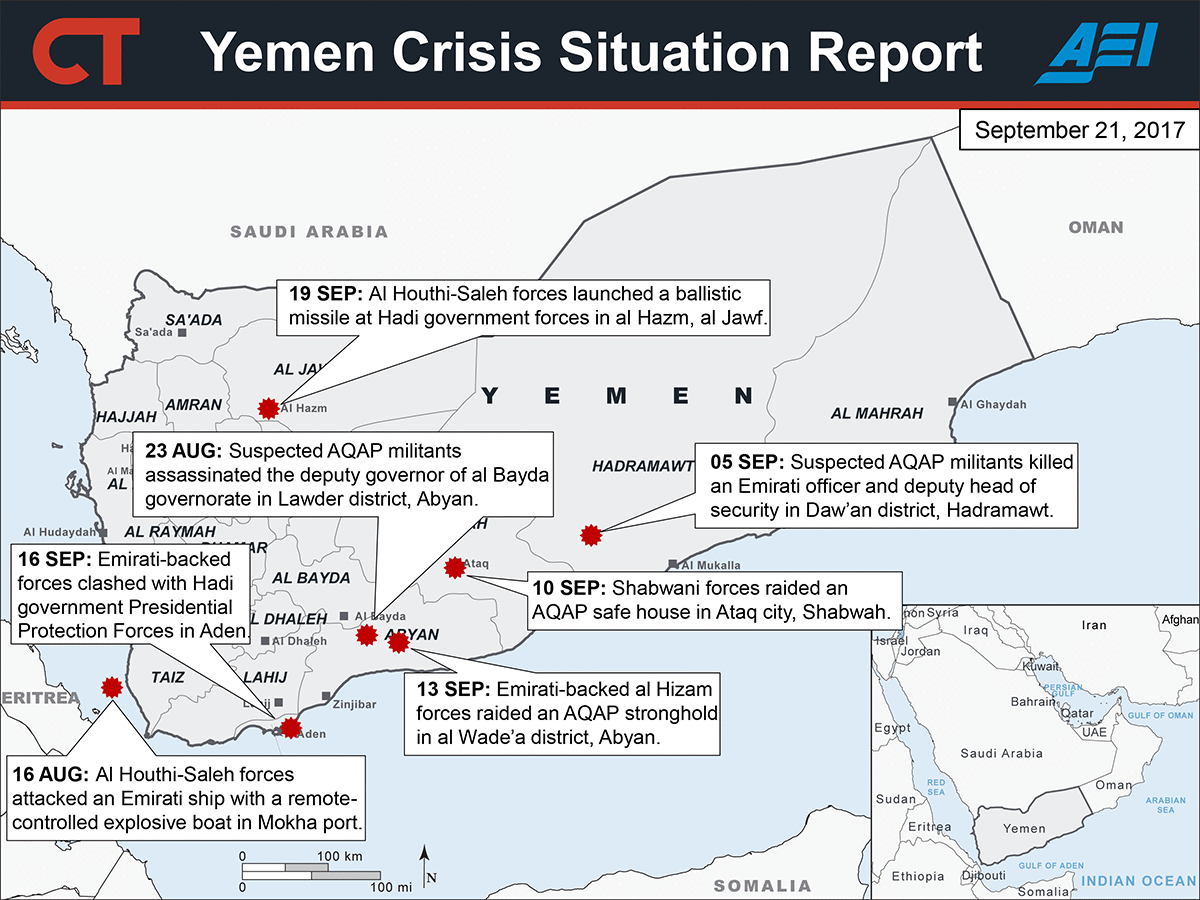Al Houthi-Saleh forces seized the Yemeni capital Sana’a three years ago on September 21. The ensuing civil war pushed the al Houthi movement deeper into the orbit of Iran's proxy network, which has provided limited capabilities to the al Houthis for an outsized effect on the conflict. The al Houthi-Saleh bloc now threatens to use its expanded military capabilities against the UAE and provides a vector by which Iran can project force into the Gulf of Aden.
Al Houthi movement leader Abdul Malik al Houthi threatened to attack the UAE for the first time, indicating a possible advancement in the al Houthi-Saleh bloc’s ballistic missile capabilities. Al Houthi-Saleh forces target Emirati forces operating in Yemen, including a mass-casualty Tochka missile attack on September 4, 2015 that killed over 45 Emirati officers in Ma’rib. Unconfirmed Yemeni reports claimed al Houthi-Saleh forces fired a ballistic missile toward the UAE two weeks prior to Abdul Malik al Houthi’s statement. Official al Houthi-Saleh news outlets have not corroborated this claim. The farthest demonstrated range of al Houthi-Saleh ballistic missiles is roughly 400 kilometers short of being able to strike Abu Dhabi if fired from within al Houthi-Saleh controlled territory. Outgoing U.S. Fifth Fleet Commander Vice Admiral Kevin M. Donegan reported that Iran continues to support the al Houthi-Saleh bloc with sophisticated weaponry. Iran or its proxies are almost certainly responsible for the advancement of the al Houthi-Saleh bloc’s ballistic missile program.
The U.S. may adopt a more aggressive strategy to counter Iranian influence in Yemen. Secretary of Defense Jim Mattis, Secretary of State Rex Tillerson, and National Security Adviser H. R. McMaster proposed a strategy to President Donald Trump that would include the expansion of American efforts to interdict Iranian shipments to Yemen. Yemeni President Abdu Rabbu Mansour Hadi claimed the U.S. supports his pursuit of a military solution to the Yemeni conflict. Hadi recently deployed forces to stage for an impending offensive on al Hudaydah port, which had been delayed from earlier this summer.
Recent tensions between al Houthi movement supporters and loyalists to former Yemen President Ali Abdullah Saleh served to highlight friction within the alliance but do not indicate that the partnership will fracture in the near term. This partnership became visibly strained in mid-August when al Houthi leaders publicly condemned Saleh’s negotiations with the Gulf States. Saleh’s General People’s Congress (GPC) party, which was planning a massive 35th anniversary celebration rally for late August, also criticized attempts by the al Houthi movement to consolidate its power in Sana’a. Calls for unity from officials in the al Houthi-Saleh government placated tensions after low-level violence related to the GPC anniversary rally broke out in Sana’a. The al Houthi-Saleh bloc remains united against the Saudi-led coalition and the Hadi government.
Emirati-backed al Hizam security forces are conducting an offensive against AQAP in Abyan governorate in southern Yemen. Al Hizam forces, backed by the Saudi-led coalition, conducted several raids targeting AQAP strongholds in northern Abyan governorate, a historical AQAP safe haven. AQAP militants reportedly fled Shabwah into neighboring Abyan in early August during a U.S.- and Emirati-backed counter-AQAP offensive that secured major population centers and energy infrastructure. Al Hizam forces withdrew from northern parts of Abyan governorate in early 2017, citing a lack of government support while facing a high rate of AQAP attacks. This withdrawal granted AQAP freedom of movement in the area.
AQAP is conducting an assassination campaign targeting tribal leaders in southern and eastern Yemen in response to Emirati-backed counterterrorism operations. Suspected AQAP militants assassinated several local leaders and security personnel in Abyan, Aden, and Hadramawt governorates following revitalized counter-AQAP efforts in Abyan and Shabwah. These assassinations mirror AQAP’s 2012-2013 campaign against tribal leaders who helped oust the group from its held territory in Abyan. AQAP warned tribes in Abyan and Shabwah governorates against joining Emirati-backed counterterrorism forces and identifies the UAE as an enemy in its propaganda. (Translated AQAP statements obtained through SITE.)
AQAP acts as a leader in the Salafi-jihadi movement and calls for attacks against the West from its safe havens in Yemen. AQAP instructed supporters on how to derail trains in the West in its latest edition of its English-language magazine Inspire. AQAP chief bombmaker Ibrahim al Asiri vowed that al Qaeda will conduct a ceaseless war against the U.S. in a message marking the 16th anniversary of the September 11 attacks. The group is also seeking to position itself as a defender of persecuted Muslims around the world by calling for attacks on Myanmar authorities in defense of the persecuted Rohingya Muslim population. (AQAP statements obtained through Telegram or translated by SITE.)
The protraction of Yemen’s civil war exacerbates the humanitarian crisis and preserves conditions that weaken American regional partners and strengthen American adversaries such as Iran and al Qaeda. The U.S. must recognize that it now has a strong interest in extricating its partners from the Yemeni conflict, which only a political settlement will resolve.
Emma Tveit and Miranda Morton contributed significant research to this situation report.

